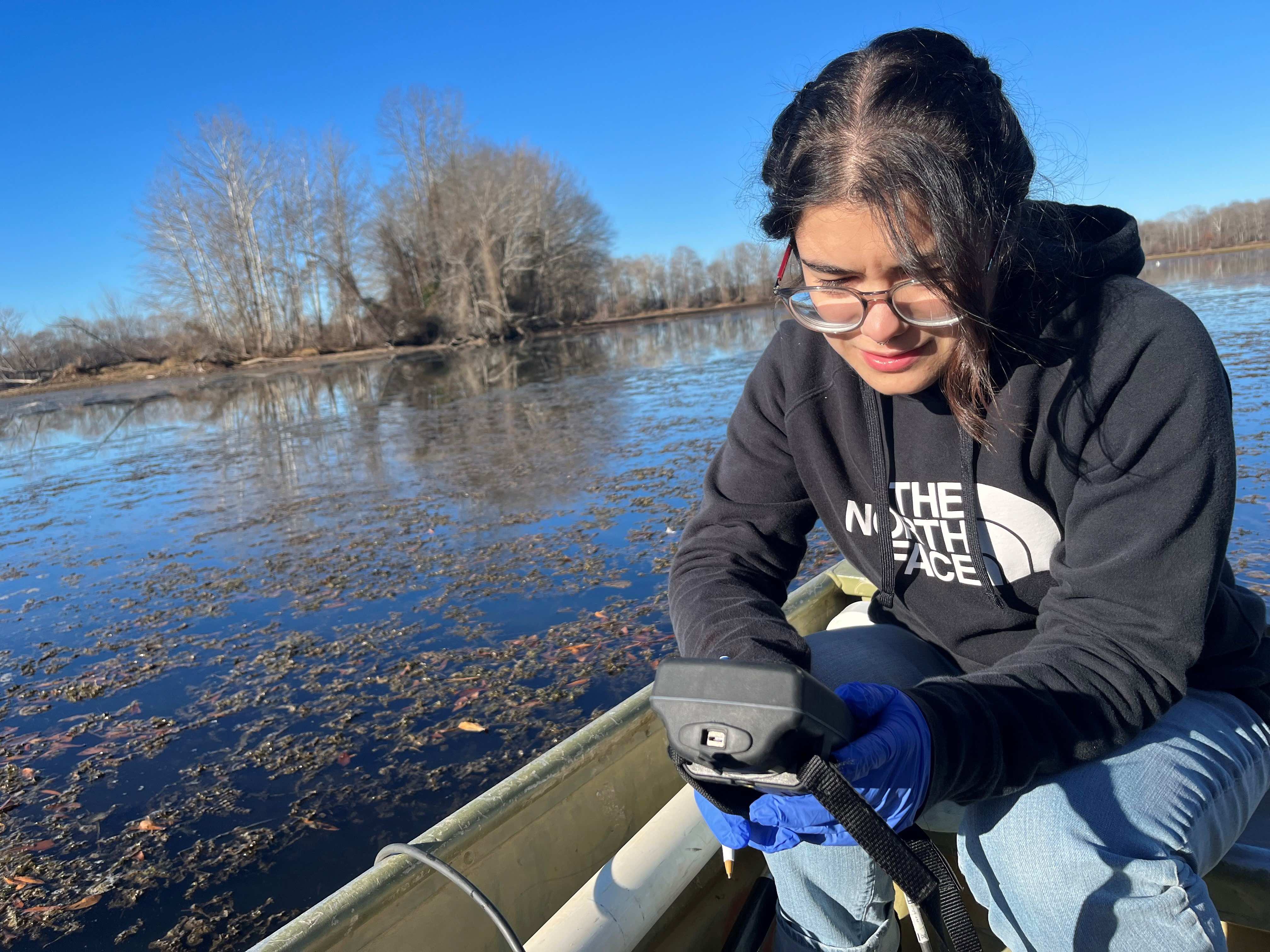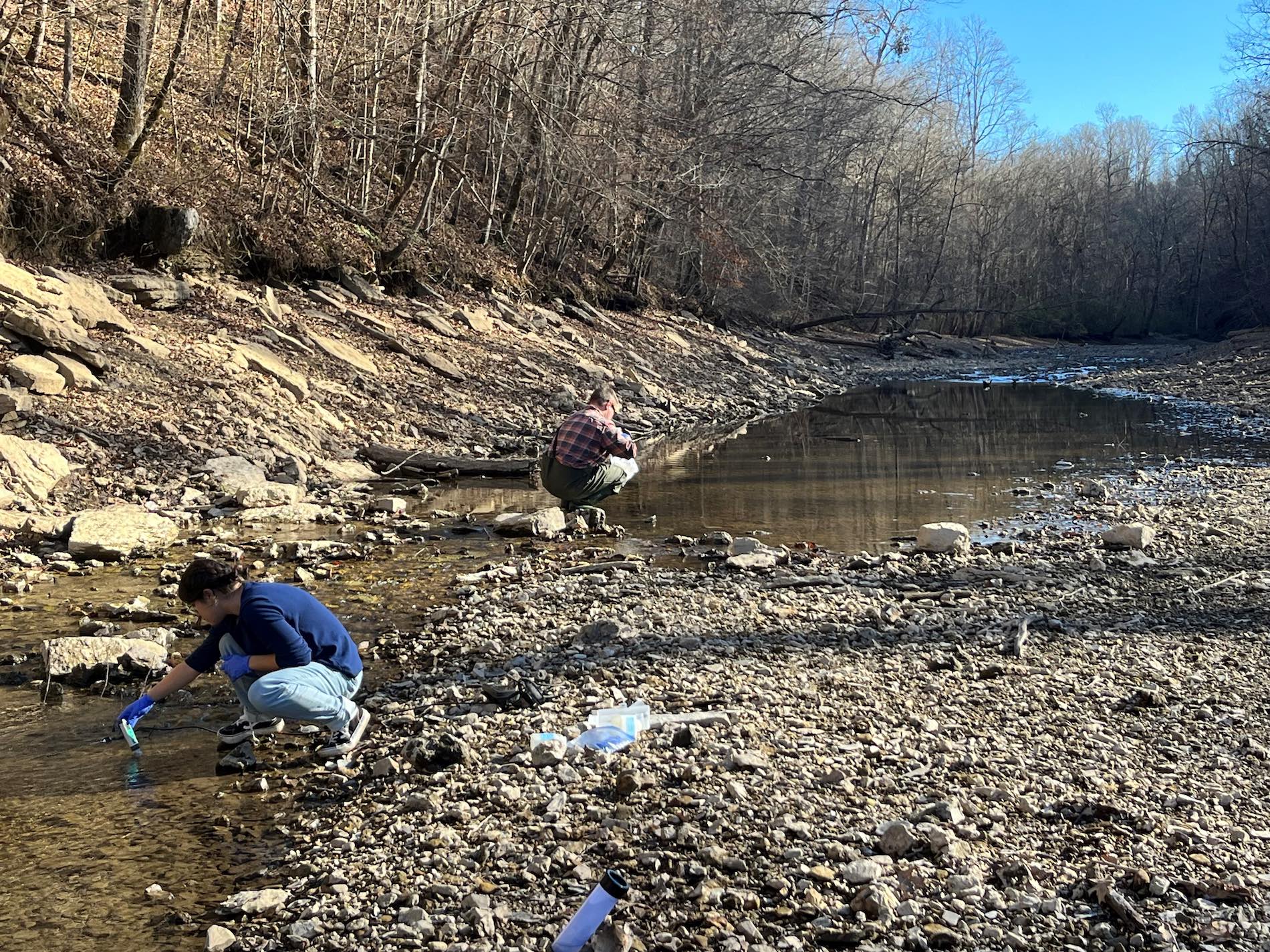Tennessee Tech Water Center celebrates 40th anniversary

Gabi De Almeida, a master's student in civil and environmental engineering, collects
water quality data in Woods Reservoir, Tenn.
Tennessee Tech University’s Center for the Management, Utilization and Protection
of Water Resources – more commonly called the “Water Center” – is celebrating four
decades of leadership in water resource management, research and innovation. The center’s
40th anniversary celebration will be held from 4:30 – 8 p.m. Friday, Oct. 4, at the
university’s Stonecipher Lecture Hall.
Attendees will have the opportunity to reconnect with colleagues, meet current researchers
and students and explore collaboration opportunities. Highlights will include presentations
and poster sessions showcasing the center’s significant contributions to improving
water quality, flood prevention and aquatic biodiversity conservation.
“Due to the hard work of our dedicated researchers, staff and students, the Water
Center continues to grow and prosper,” said Justin Murdock, director. “This year we
have activated a record amount of external research funding that is being used to
improve water quality, reduce flood loss, conserve and improve aquatic biodiversity
and enhance water resources throughout Tennessee and beyond.”
The Water Center was founded in 1984 as part of the Tennessee Centers of Excellence
program, with a goal to provide information and data to support the management, utilization
and conservation of water and aquatic ecosystems in light of the increasing demands
on water resources in Tennessee and the surrounding regions. Through a mission grounded
in research, education and public service, the center uses an interdisciplinary team
of professionals to tackle water-related challenges.
Over its 40-year history, the center has made strides in areas such as isolating waterborne
diseases, developing methods to limit the transmission of chemical and microbial threats,
collecting data on vulnerable aquatic species, and managing multiple sport fisheries.
These efforts have been critical in protecting public health, safeguarding ecosystems
and optimizing sustainable use of aquatic resources.
“Since its founding, the overall goals of the center are mostly the same, but I’d
say the prioritizations of them were different 40 years ago than they are today,”
Murdock said. “And that is probably due to both a changing demand on water resources,
and a change in faculty expertise in the Center between then and now.”
Although it was originally located in the College of Engineering, the Water Center
has maintained expertise in other fields such as biology, chemistry and agriculture
since its inception. This holistic approach and continued focus on servicing the larger
community is maintained today. Currently, the center’s state-certified water quality
laboratory provides a variety of services to the public, municipalities and private
companies. Staff are available to help with issues such as lead and bacteria testing
for homeowners’ water, assistance with state and federal regulation compliance for
businesses, and support research both within and outside the University.
“We work across many different scales,” Murdock said. “We're working for individuals,
cities, and states, as well as regional, national and international organizations.
It takes collaboration among a diverse set of stakeholders to solve the diverse water-related
issues of today’s world.
Over the years, their projects have touched on topics such as aquatic biodiversity,
water quality, flood warning and prevention, and stormwater runoff. Wastewater management
has been another priority, with the center collaborating with local cities like Baxter
and Livingston. They have also been involved in monitoring water leakage from landfills,
studying Legionella bacteria in relation to Legionnaires' disease, investigating the
effects of pharmaceutical contamination on fish populations, and researching new emerging
contaminates including microplastics and PFAS. Additionally, expertise in fisheries
provided by the USGS Cooperative Fisheries Unit at Tech and the Department of Biology
have tightly linked the Center to the Tennessee Wildlife Resources Agency, US Fish
and Wildlife Service (USFWS), and National Parks Service, among many other state,
federal and non-profit groups.
Gabi De Almeida, a master's student in civil and environmental engineering, and Peter
Blum, a Ph.D. student in environmental sciences and biology, collect samples for per-
and polyfluoroalkyl substances (PFAS) in a central Tennessee stream.
“The expertise that we have ranges from the genetic level all the way to the watershed
level, with many areas in between,” said Grace Tinker, the center’s research lab manager,
who also conducted her Ph.D. research at the Water Center.
The Water Center additionally provides essential training for Tech students across
a variety of disciplines, from biology to engineering majors. They get the opportunity
to gain hands-on experience with real-world research projects. The center’s graduates
have gone on to work in various environmental fields, including positions at most
every regional state and federal agency including TWRA, the Tennessee Department of
Environment and Conservation, USFWS, US Army Corps of Engineers, Oak Ridge National
Laboratory and many others.
“Students working on their master’s and their Ph.D. get the opportunity to do real
research and work on real projects – and not only real projects but ones that make
a real impact,” said Jeannie Smith, current director of the Student Success Center
and former lab office manager with the Water Center.
In the 40 years since their existence, faculty and staff at the Water Center report
that the state has consistently provided funding support each year, and Tech faculty
and Center researchers have secured continuous support from external funding sources
to support the center’s mission.
“The center continues to grow in expertise with the emerging water research needs
of Tennessee and the country. We have a bright future ahead of us and look forward
to continuing to provide the state with data and information to manage, use and protect
our water resources,” Murdock said.
The 40th anniversary celebration of the Water Center is open to the public, but those
planning to attend should RSVP as soon as possible by contacting Grace Tinker at gtinker@tntech.edu or 931-372-3843.
The event will begin with live music and refreshments at 4:30 p.m., followed by a
presentation on the center’s history and current research, a mix and mingle with heavy
hors d’oeuvres and end with door prize drawings.
For more information about the Water Center and its services, visit https://www.tntech.edu/research/wrc/.

